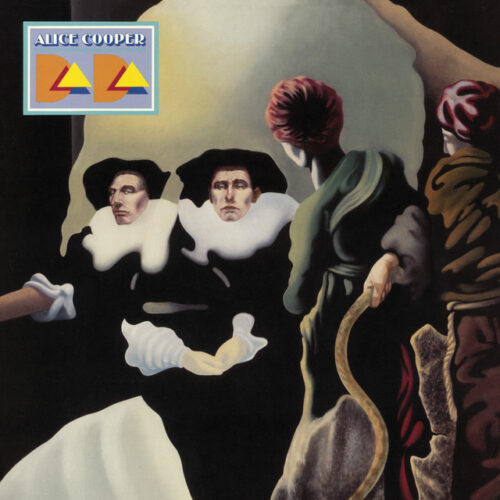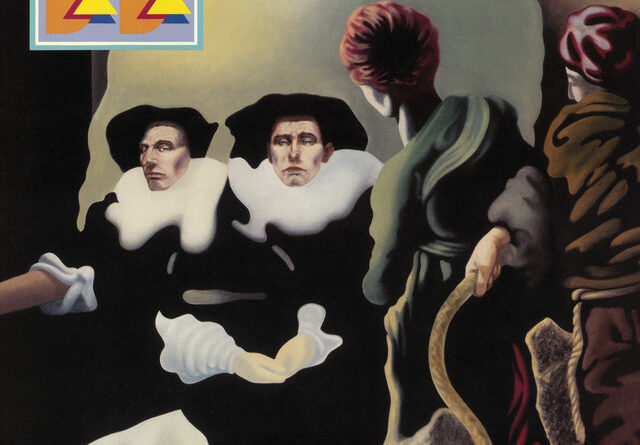HEAVY MUSIC HISTORY: DaDa – Alice Cooper
The start of the 1980s was not a good time for ALICE COOPER – both the man himself, born Vincent Furnier, and the music career he had embarked upon under the same name. As the new decade reared its head, Cooper found himself back in the throes of an alcohol addiction that he had seemingly kicked several years prior (as immortalised in 1978’s From The Inside). Since then, Cooper had dabbled with a few new habits along the way, both chemical and musical. Kicking off the decade with a stylistic shift in new-wave influenced Flush The Fashion (1980), Cooper went on to release three more records he would later refer to as his ‘blackout albums’. At the tail end of this trilogy was DaDa, a haunting collection of tracks that still stands as Cooper’s most unsettling.
Released in 1983, DaDa saw Cooper reunite with two of his most significant long-time collaborators. Producer Bob Ezrin had been part of the Cooper camp since the original band’s breakout and even guided the ship as Alice went solo, but had been absent from the musician’s records for the last six years. Guitarist and songwriter Dick Wagner had joined the fold when Cooper went solo and helped shape most of his 1970s solo output. Taking on similar roles as before, both Ezrin and Wagner would help write much of the material across DaDa. But they were also instrumental in getting it made in the first place.
Ahead of DaDa, Alice Cooper was contractually obliged to record one more album with Warner Brothers. However, Cooper was not in much shape to produce one nor particularly wanted to. Wagner – at the request of Ezrin – coaxed Cooper in to writing, staying at his home in Arizona and constantly riffing ideas in Alice’s presence. Cooper eventually bit and the two started laying out the foundations of DaDa, before upping sticks to Toronto where Ezrin was located. Speaking to DecibelGeek in 2014, Wagner detailed that he and Cooper holed themselves up in the two-bedroom suite of a local hotel. They would write songs one day, demo it the next and fill the rest of the time drinking before eventually decanting to ESP Studios. There, they would refine and record with Bob Ezrin.
For the recording, the trio took a distinctive approach to instrumentation. While Wagner contributed guitar and bass, the vast majority of DaDa’s music comes courtesy of the Fairlight CMI – a digital sampling synthesizer that, at the time, was state of the art. “This was one of the first sequenced and electronic based albums,” Ezrin noted to Carl Linnaeus in 2020. “But it’s dated, because those were the early days.”
Live instrumentation is light on DaDa, with only a few tracks sporting actual drums. The Fairlight took over more than just percussion though, providing multiple layers of odd sounds beyond standard synths – the approximation of horns on Fresh Blood and the pseudo-Native American atmospherics on I Love America for example. Ezrin spent hours painstakingly programming the various sounds, sequences and melodies that would bring the songs to life. As cutting edge as it was for 1983, time has made the Fairlight CMI sound somewhat thin production-wise. Yet, its inhuman sounds were oddly fitting for the strange material that the team worked up for DaDa, especially as Cooper continued to rejig and rewrite lyrics in the studio while the songs came together.
A concept album of sorts, the narrative thread on DaDa is loose at best with each track feeling like its own self-contained vignette. The central character, Sonny, seems to be someone dealing with multiple personalities that span the gamut from maligned son to shopping mall Santa. And while it’s played for laughs at points (No Man’s Land features said Santa in an identity crisis, whereas I Love America is a sarcastic dressing down of the USA’s cultural idiosyncrasies), DaDa also provides some of the darkest material Cooper has ever committed to record. The disconcerting conversation of the opening track wouldn’t sound out of place introducing a KING DIAMOND record, whereas its follow-up Enough’s Enough bleakly details a child’s life being turned upside down. Even a dig at label Warner Brothers is transformed in to a piano-driven nightmare about an aging shut-in on Former Lee Warmer. But it’s closing track Pass The Gun Around that is the album’s emotional nadir, with protagonist Sonny seeing blood run from his eyes as he reaches for a morning drink. Speaking about the song to Linnaeus in 2014, Cooper mused, “When a writer writes, they’re always confessing a certain amount of what’s going on in their life.” Pass The Gun Around in particular paints a dismal picture of where Alice himself was at that point.
When Cooper, Ezrin and Wagner turned in DaDa to the label, Warner Bros. were surprised to say the least. The relationship between artist and label was already strained as a result of Cooper’s last few albums tanking and Warner expected him to take the budget and part ways. As a result, DaDa instead released with little fanfare. With no promotion from the label and no tour from Alice, it made few waves commercially – in the UK, it squeaked on to the charts at #93 briefly, but didn’t even get a look in in the States. It wasn’t long after recording that Cooper himself would hit rock bottom and finally resolve to get clean for good.
As Cooper has no recollection of recording the album, it has been nixed from the musician’s modern narrative and none of its material has ever been played live. With no commercial aspirations for the record, DaDa is an honest and authentic representation of where Alice Cooper was artistically in 1983, reckoning with his problems through metaphor and dry humour.
Cooper has often spoken about ‘Alice’ being a character. When ‘ol’ black eyes’ returned three years later with Constrictor (1986), the ‘Alice’ introduced was almost a caricature of the original’s unhinged edginess. Surrealism was dropped for slasher flicks, art rock for hair metal and ‘Alice’ only existed on the stage. Off-stage, while sharing the same name, it seemed like the affable ‘Vince’ had regained control. The preceding decade had seen the distinction between ‘Alice’ and ‘Vince’ blurred as the man behind both fell deep in to addiction. DaDa in many ways marks a point where ‘Alice’ had won the power struggle entirely. Considering the record’s themes of split personalities and Sonny’s difficulty dealing with their actions, DaDa feels like the last confessions of a now latent ‘Alice’ persona.

DaDa was originally released on September 28, 1983 via Warner Bros.
Like ALICE COOPER on Facebook.

This made for good reading. Thanks. Dada is a beatufil album
My favourite album of all time. When Dick Wagner hits that note at 3:32 in Pass the Gun Around it’s pure magic. Fresh Blood is a masterpiece. No Man’s Land would’ve made a brilliant video.
My favorite Alice Cooper album! Even did a podcast on it recently. Also, the interview with Dick Wagner referenced here, if you are a fan of DaDa, is WELL WORTH a listen. Great article Sam! Very well done.